- Home
- Peter Straub
Shadowland Page 12
Shadowland Read online
Page 12
'No, sir,' I said. 'But may I ask you a question?'
He nodded.
'Did you also speak to Steve Ridpath?'
His eyes flickered. 'We shall come to that in time.' He arranged three pencils before him, the sharpened points toward me like a row of tiny stakes. 'Firstly, boy, whatever aim you may have in concocting a preposterous story like this is quite beyond me. I have told you that I spoke to young Nightingale. He completely denies that he was beaten with a belt. He did admit that Mr. Ridpath's son, a senior, found you in an area normally off limits to frosh, and rebuked you for being there.' He held up a hand to shut off my protest. 'It is true that two of you, Morris Fielding and young Nightingale, had permission to be on stage. Steven Ridpath of course had no way of knowing that. He may have acted imprudently, but he acted in the interest of discipline, which is in line with the general improvement in his work this year. I requested Mr. Hillman to inspect his godson's back, and Mr. Hillman reported to me that he found no indications of any such beating as you — and Fielding, regrettably — claim took place.'
'No indications,' I said, not believing.
'None whatsoever. How do you account for that?'
I shook my head. Those welts could not have disappeared so soon.
'I can explain it to you, then. None took place. I believe Steven Ridpath when he says that he made young Nightingale do several push-ups and slapped his back, which was covered by shirt and jacket, when the push-ups were performed sloppily. Initiation is officially over, but in unusual circumstances the school has turned a blind eye to its continuance. When we felt that it was done to preserve order.'
'Order,' I said.
'Something it seems you know little about. To proceed. Of course we found no traces of the Ventnor owl backstage. Because it was never there. We did find written — out examinations in young Ridpath's handwriting, to be used by him as a study aid after the examinations took place.'
'That doesn't make sense. He used the exams as study aids when he'd already taken them?'
'Precisely. To keep his grasp of the older material. A very wise thing to do, I might add.'
'So he's going to get away with it,' I said, unable to keep from blurting it out.
'Quiet!' Mr. Thorpe banged the metal desk and made the pencils jump crazily. 'Consider, boy. We are going to be lenient with you. Because young Fielding's family has attended the Carson School for fifty years, and he thinks he saw what you also think you saw, Mr. Fitz-Hallan and I agree that perhaps you are not consciously trying to mislead us. But you leaped to conclusions and substituted your imagination for what you actually saw — a typical example of the irrationality which has been sweeping through this school, and which Mr. Broome has worked so hard to combat.' The thought of this seemed to deepen his rage. 'Such fantastification as we have had here in the past month is beyond my experience. Perhaps some of our English people should stick to factual texts in the future.' A burning sideways glance at Fitz-Hallan. 'A school is no place for fantasy. The world is no place for fantasy. I have already said this to Morris Fielding. Mr. Weatherbee . . . '
The adviser straightened up beside me. 'Perhaps you can keep a closer eye on incipient hysteria in the freshmen. Teachers must do more than teach, here at Carson.'
When our class went to the locker room to undress for an intramural basketball game, I looked at Del Nightingale's back as he pulled off his shirt. It was unmarked. Morris Fielding noticed that at the same time I did. I remembered the glass owl flying or seeming to fly out of the bench, making a whirring beetlelike noise, and knew from Morris' expression that he remembered it too. And though I had planned to use the minutes before the intermural game to talk to Del, I backed away, as if from the uncanny.
Tom's father died at the end of March.
14
I Hear You
Chester Ridpath switched off Ernie Kovacs on the old twelve-inch Sears television in the living room and covertly looked at his son, who had eaten only half of his Swanson TV Chicken Dinner. The kid was starving himself — half of the time he forgot the food was there in front of him, and stared off into space like a zombie. Or like something from those movies he liked, something that only pretended to be normal and okay. . . . Chester immediately banished these thoughts and sent them into the limbo where he had consigned everything he had thought or imagined about the 'hazing' incident two weeks earlier. Old Billy Thorpe had stuck up for Stevie, but Ridpath could see that despite his loyalty to a colleague, Billy wasn't quite sure in his own mind that he had done the right thing — every now and then he looked like a quarterback fourteen points down. Of course they had all felt like that lately, with Laker Broome cracking up in chapel the way he had and nobody knowing from one minute to the next if the head would keep his job. What a terrible year it had turned out to be. . . . He picked up the TV dinner's aluminum pan from the footstool in front of him and on his way out of the room took Steve's half-eaten dinner too. The kid smiled faintly, as if half-thanking, half-mocking him.
Thank God Billy Thorpe had never seen Steve's room.
Because that was the problem. Any kid who wanted to surround himself with garbage like that was the kind who could use a belt on a freshman or cheat on his exams.
Hell, Steve didn't cheat.
Did he?
Ridpath balled up the two crinkly pans and dumped them into the bin. Waste. His own father would have belted him from here to kingdom come for throwing away food. Just look at him now. If a fly landed on his nose, he wouldn't brush it off.
So talk to him. You talk to kids all day long.
Talk at them.
Better than nothing.
No, nothing was better. He'd seen Steve's face sometimes when he was in the middle of a story. Indifference. Blank as the face of a corpse. Even when he was just a short-pants kid, sometimes he'd crack him one and see that same expression on the little shit's mug . . . Jesus, he was glad Billy Thorpe had never seen that awful crap up in Steve's room. If that was the kind of stuff the kid had on his mind . . .
'Hey, Steve,' he said, and went back to the kitchen door. 'Isn't that Kovacs kind of strange? Bet those cigars cost . . . ' He stopped the sad attempt at conversation. Steve's chair was empty. He had gone back up to do whatever the hell it was he did in that room.
Should go in there and rip out all that evil junk — just rip it out. Then tell him why — tell him why it's for his own good. Should have done it long ago.
No: first tell him why, then rip it out.
But of course it was too late for that. How long had it been since he and Steve had really talked? Four years? More?
Chester finished wiping the silverware dry and crossed the untidy living room and stood at the bottom of the stairs. At least that savage music wasn't on; like his good grades, it could be a sign that Steve was growing up, and getting old enough to know that all you had to do was burn the damn ball back, just forget the pain and return the fire. Wasn't that what a father had to teach his son? If you don't land the first punch, be goddamned sure you land the second.
'You busy, Steve?' he called up the stairs. There was no answer. 'How about a talk?' And surprised himself — his heart beat a little faster.
Steve was not listening: he was pacing around the bedroom, his feet going bang bang on the linoleum. Praying to the pictures, or whatever he did when he wasn't varnishing.
'Steve?' Bang, bang, went the footsteps, echoed by his heart. Ridpath went halfway up the stairs and reached the step from which he could see his son's door, which was closed. Through the crack at the bottom of the door, with his eyes right at the level of the floor and looking through the posts of the railing, Ridpath could see the bottoms of Steve's loafers, pacing past. Bang, bang, bang, bang. Steve was patrolling from one end of the room to the other, metronomically, wheeling around when he reached a wall and marching back in a straight line. Marching, he was mumbling something to himself: it sounded like I hear you, I hear you to Chester. I bang hear bang you bang I bang he
ar . . .
'Okay, you hear me,' he said. 'How about coming out and having a beer with the old man?' His throat was dry — hell, you'd almost think he was afraid of Steve. 'A beer sound good?' he asked, and was pathetic even to himself.
I bang hear bang you bang I bang hear bang you bang I bang . . . The black bottoms of the shoes appeared in the crack at the bottom of the door, one, two, hayfoot, strawfoot, came back in five or six seconds, vanished. 'Beer?' Chester muttered, realizing that whatever Steve was hearing, it was not his father.
Sometimes Steve acted like he was tuned in to another world, somewhere out in space where all you heard was the far — off metallic voices on a lost radio beam.
'Aaah,' Steve uttered, a single private moan of pleasure or insight, and his feet went by the door again — it was as if someone had just finished explaining something to him.
Then Ridpath, his face glued to the newel posts of the half-railing on the second floor, remembered a terrible dream, what must have been a dream, from the winter before — a huge bird fighting against Steve's window, breaking the glass, whapping its big wings against the side of the house and tearing with its talons. . . . 'Oh, my God,' he whispered.
Steve was going aaah now, but Ridpath could not see the black bottoms of the loafers as he went past the door.
Beating, beating, thundering at the house, whipping that awful beak from side to side . . . Ridpath had a sudden irrational notion that now that nightmare bird was upstairs in Steve's room . . .
bang, went one foot on the left side of the room, where the window was, and then bang, bang, both feet on the right-hand side of the bedroom.
Bang. Just as if he had touched down back on the window side of the room — just as if that nightmare bird was ferrying him back and forth, the joy of flight causing aaah aah to bubble out of his throat couldn't be, he wasn't hearing right, there was some reason why he could no longer see Steve's loafers move past the door . . . some reason . . . those damn kids and their endless talk about bad dreams. I was up in the air and no one could get me down. Ridpath felt his whole body go cold. Whisper, went Steve's loafer on the right side of the room, and — an instant later — whisper, on the left.
'Come talk when you're ready,' Ridpath said, but only to himself.
That was on a Friday night. Chester Ridpath fled into the basement and uncorked a bottle of Four Roses he kept hidden under his workbench.
15
Two Saturdays after that, Tom Flanagan left his mother's side for the first time since the funeral. From the morning of Hartley Flanagan's death, his son and wife had been as if welded together: they had gone together to the funeral director and made the burial arrangements, had eaten every meal together, lingered together in the living room at night, talking. Mr. Bowdoin, the insurance man, had explained to both of them that Hartley Flanagan had left enough to pay all the bills for years to come. Together they had conferred with the Reverend Dawson Tyme, planned the funeral — Tom sat beside Rachel while she made all the telephone calls. He sat beside her while she cried, sat beside her and said nothing when she said, 'It's better he's gone, he was in so much pain.' Sat across the room in an uncomfortable Victorian chair when the fat Reverend Mr. Tyme returned and crowded beside his mother on the couch and blew out little minty breaths and said, 'Every tragedy has its place in his plan.' Saw that she, like himself, doubted the plan and mistrusted any man who would invoke it. Shopped with her; with her opened the front door to their visitors; stood beside her in the crowded funeral parlor during what the director called 'the visitation'; stood beside her finally at the grave on a wanning Sunday and realized that it was April first — April Fool's Day. And watched the crowd of Hartley's fellow lawyers and their wives and Hartley's friends and cousins and saw grief on some faces, restlessness on others, even embarrassment on others; there was no time to talk to any of the mourners, not even Del. They had to get back to the house and serve the food keeping warm in the oven. Chin yourself up out of that grave, he said to his father, just get out of there and be like yourself again, but the dry sun came down on them, the Reverend Mr. Tyme talked too much and pretended that he had been a friend of his father's, an April wind blew sand onto the graves and stirred the flowers. The grass looked sharp enough to inflict wounds. When it was over, he too cried and did not want to leave the grave. He looked at fat, minty Dawson Tyme and the lawyers — all of them were sleek, well — fed beasts, carnivores. A wall had crumbled, an anchor had snapped; he was without protection. The vulture had won and now it was Tom's turn to begin the walk into that long valley.
'You don't have to go to school for a while, do you?' asked his mother once they were back in the spiritless house. No. He did not.
After the fourth day his mother said, 'Don't you want to get out of the house, Tom?' and he said no. After the fifth day she repeated her question and said that they had to think about his going back to school and making up his lost work: again he said no. Resuming his normal life seemed a betrayal of his loss. When Rachel Flanagan repeated, her question after the sixth day, he recognized that he was now no longer a temporary adult. 'You haven't seen your handsome little friend Del since the funeral,' she said. 'Don't you want to practice for your show? And anyhow, it'll do you good to get away for a while.' 'He lives in Quantum Hills now,' he said. 'The Hillmans finally bought a house. It has a pool and a tennis court.'
'Quantum Hills.' Her voice was faintly ironic. 'Isn't that nice? And the suburban bus line goes right to the shopping center.'
'Yeah,' he said. 'Maybe I'll go out there.'
She embraced him.
Once out of the shopping center, he walked for half an hour along a street so black it shone. Enormous houses, some on landscaped hills and others in landscaped valleys, hovered like dream palaces far back on endless lawns. Whipping sprinklers whirred and sprayed, making rainbows which kept the grass green. Striped awnings shaded the vast windows. It was a suburb where no one ever walked. What was Del doing here, in the city's most artificial and dream-struck setting, this place of pools and tennis dresses? It suited the Hillmans, but it could not possibly be what Del wanted for himself. But — this came to him as he turned into the curving banked street — it was what Carson wanted for them: already many of their classmates lived here. Howie Stern and Marcus Reilly, Tom Pinfold and Pete Bayliss, six sophomores, took the bus the school sent out to Quantum Hills. All the stringency of life at Carson was meant to lead them to a place like this. If he had not met Del, if his father had not died, he would never have seen its absolute remoteness from him. He would have (he imagined) slid toward Quantum Hills as if on greased rails. He could not, now. He could only invent his future as Del was doing; he had been shaken from his frame.
Then just for an instant it seemed to Tom as if the shining blackness of the street was lapping at the cuffs of his trousers, the pale sky dark with witches. From a thin branch a starling screeched and fixed him with its black eyes. The world tilted.
This passed as quickly as it had come. The street subsided, the air cleared, the houses righted themselves. None of it could give a warning, because it represented a way of life in which warnings were obsolete. Tom realized that he was directly before the house Del's godparents had bought.
It was the classic Quantum Hills house, and the largest on the street, set far back on a rising treeless lawn. A wide asphalt drive curved up before it, marked by carriage lamps on tall dark poles. Where the drive met the two wide steps up to the entrance, the iron figure of a small black jockey held out a bright metal ring toward the rear bumper of a Jaguar. Modern, vaguely Moorish in design, the house sprawled behind these signs of a new Arizona prosperity.
Tom began to trudge up the drive, walked past the Hillmans' car and the sightless boy holding out his shining ring, mounted the steps. Something in his chest seemed to be trembling. He pushed the bell and jerked back his hand as if he had expected a shock.
The white door swung open, and Bud Copeland was looking down at him, smiling. '
Hello, son. You here to see Del? Come on in, I'll take you up. You don't exactly need a map, but the first time, you might need a guide.'
'Hello.' Tom said tonelessly.
'You get yourself in here, young man, you look like you need a friend. Come on, get yourself through this doorway.'
Tom moved through the doorway and into a wide entry which revealed half of an enormous living room, a stone fireplace nine feet high, furniture and boxes dumped here and there before a window the size of a wall. That it looked much as he had imagined it was reassuring — the odd unplaceable fear subsided.
'I heard about your father, son,' Bud's velvet voice said beside him. 'Terrible thing for a boy to lose his dad. If there's anything I can do to help, just ask.'
'Thanks,' Tom said, surprised and moved by the real sympathy in the man's face and voice. 'I will.'
'You do that. I'll do anything I can. Now. What do you think of our new quarters?'
'It's a big place,' Tom answered, and thought he saw buried amusement in Bud's civilized face.
'My mother always told me to be careful too, Tom Flanagan,' Bud said, and took him up a floating staircase at the side of the living room. 'You and Del should have your tricks all polished up by now for your performance. If you still plan on giving it.'
'Yeah, sure, but we still have to do some work,' Tom said, following Bud's enormous back down an eggshell-white hall. 'Oh, yeah, we're going to give it. You bet we are.'
'Happy to hear it, son.'

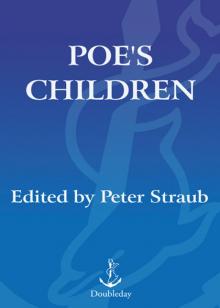 Poe's Children: The New Horror: An Anthology
Poe's Children: The New Horror: An Anthology Koko
Koko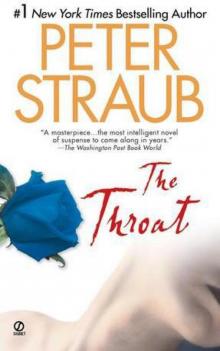 The Throat
The Throat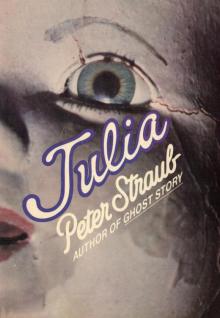 Julia
Julia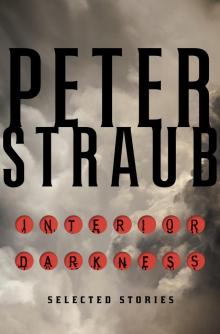 Interior Darkness: Selected Stories
Interior Darkness: Selected Stories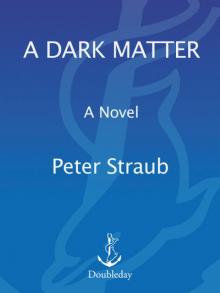 A Dark Matter
A Dark Matter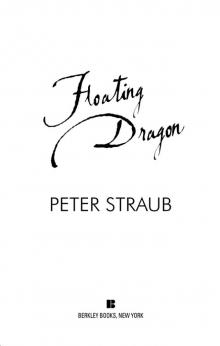 Floating Dragon
Floating Dragon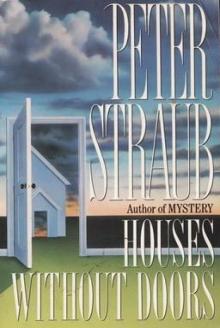 Houses Without Doors
Houses Without Doors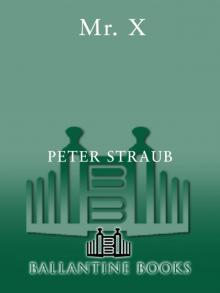 Mr. X
Mr. X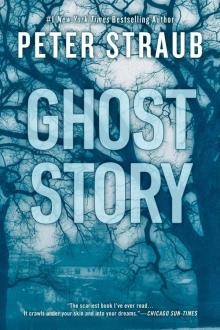 Ghost Story
Ghost Story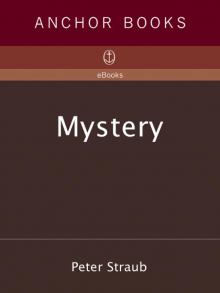 Mystery
Mystery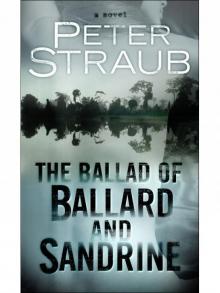 The Ballad of Ballard and Sandrine
The Ballad of Ballard and Sandrine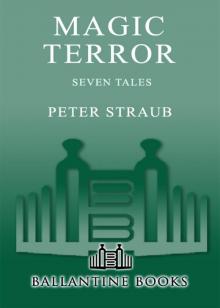 Magic Terror
Magic Terror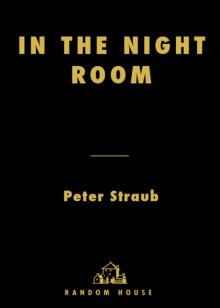 In the Night Room
In the Night Room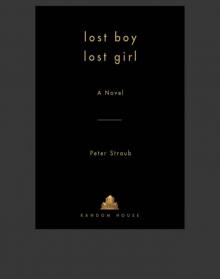 Lost Boy Lost Girl
Lost Boy Lost Girl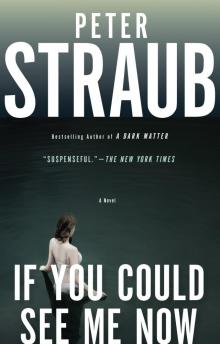 If You Could See Me Now
If You Could See Me Now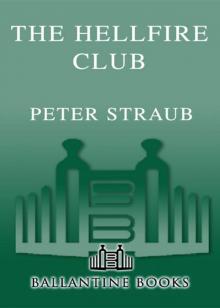 The Hellfire Club
The Hellfire Club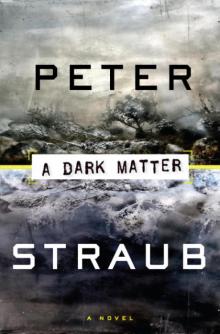 A Dark Matter: A Novel
A Dark Matter: A Novel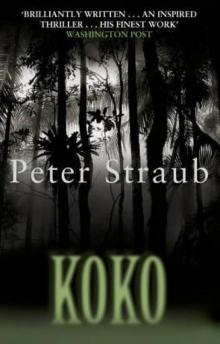 Koko brt-1
Koko brt-1 Shadowland
Shadowland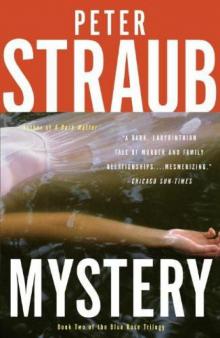 Mystery brt-2
Mystery brt-2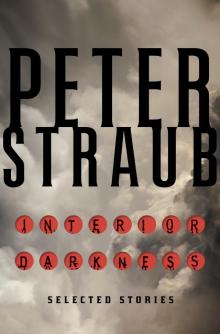 Interior Darkness
Interior Darkness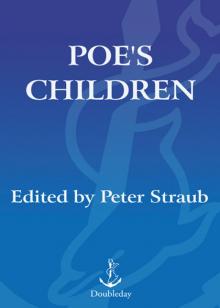 Poe's Children
Poe's Children